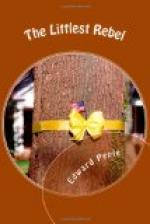But again a shell passed over them and again the world was filled with that awful whining, shrieking sound.
“Daddy,” the child cried, with quivering lips, but still dry eyed. “I don’t like those things. I don’t like’em.”
“There, there, darling,” he comforted as they shrank closer under the protection of the wall. “Keep down under my arm and they won’t bother you.”
As he spoke a twig with a fresh yellow break in it fell from a tree and struck his upturned face. He winced at the thought that the bullet might have flown a few feet lower. And meanwhile the sound of the firing came steadily closer.
“By Jove!” he murmured to himself, “it’s a bigger rumpus than I thought.”
This indeed was true. What had at first promised to be only a skirmish between the outposts of the two entrenched armies, now developed into a general engagement covering a space of half a mile along the line. A reconnoitering force of Federal cavalry had ridden too close to the rifle pits of the Confederates, and, as Morrison himself expressed it, “the hornets came out and began to sting.”
Major Foster, commanding a larger force of cavalry, rode out in support of his reconnoitering party, and found himself opposed, not by a straggling line of Rebel pickets, but by a moving wall of tattered gray, the units of which advanced on a low-bent run, crouching behind some bush or stone, to fire, reload and advance again.
An aide raced back to the Union lines to ask for help in support of Foster’s slender force of cavalry; and thus the order came to Morrison to join the detachment and hold the enemy until reinforcements could be formed and pushed to the firing line.
The delay, however, was well nigh fatal for Morrison and Major Foster, and from the point where Cary and little Virgie watched, the case of the Union horsemen seemed an evil one. True, that infantry and guns were soon advancing to their aid on a “double-quick”; yet all the advantage seemed to lie with the ragged, sharp-shooting Southerners.
The crackle of musketry increased; the dust rolled up and intermingled with the wreathes of drifting smoke, and through it came the vicious whine of leaden messengers of death.
Then, borne on the wind, came a sound that he would know till his dying day—the rebel yell. An exultant scream,—a cry of unending hate, defiance, victory!
He sprang to his feet. Off came the battered old campaign hat and unmindful that he stood there hidden in the woods and that his voice could carry only a few yards against the roar of battle, he swung it over his head: and shouted out his encouragement.
“Look! We’re whipping ’em. Virgie, do you hear? We’re getting them on the run. Come on, boys! Come on!”
He felt her clutch on his sleeve. With wide eyes grown darker than ever with excitement, she asked her piteous question.




